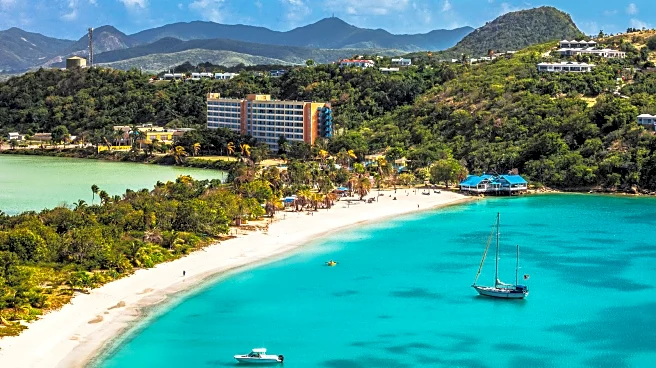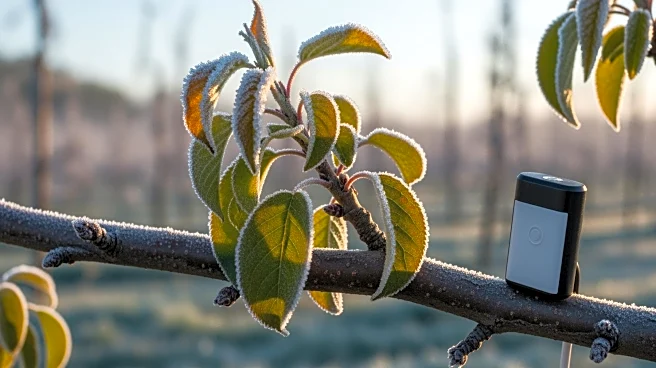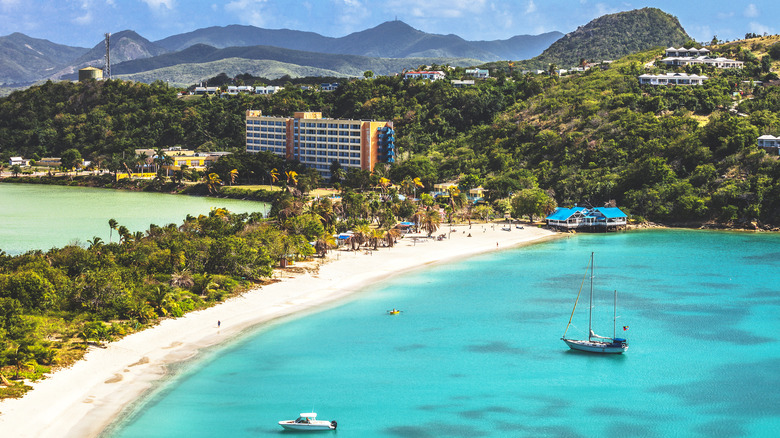
There are few destinations that hold the same tropical novelty as the Caribbean islands. With 13 sovereign nations, 28 inhabited islands, over 7,000 islets, islands, and keys, and the second-largest coral
reef system on the planet, the region offers almost endless possibilities for dreamy escapes. But paradise isn't only about palm trees and sandy beaches. When it comes to choosing where to visit, safety often tops the list of concerns. Each of these five safest Caribbean islands has its own personality — Aruba with its Dutch-Caribbean charm, Barbados as the birthplace of rum, and Curaçao with its popular dive sites.
To determine which islands are truly the safest, researchers created the Caribbean Island Safety Index — a data-driven methodology that evaluates each island based on four factors: U.S. travel advisories, crime and tourist safety, hurricane risk, and access to emergency healthcare. Each of these elements is weighted based on what travelers tend to value most when considering safety. Travel advisories and crime make up the largest portion at 30% each, followed by healthcare at 25%, and hurricane risk at 15%. Each island received a score out of 10, with that being the best possible rating for safety.
It's worth noting that travel advisories issued by the U.S. don't always tell the full story. These guidelines are shaped by a mix of factors, including crime, terrorism, disease, civil unrest, and natural disasters. They range from Level 1 (lowest risk) to Level 4 (highest risk). That said, safety is typically on the rise in the Caribbean. In Jamaica, for instance, the U.S. has recently downgraded its travel advisory from Level 3 to Level 2, as crime rates continue to drop. This kind of progress highlights the ever-evolving safety landscape across the Caribbean.
Read more: The Hidden Dangers Of Swimming In The Caribbean Sea
Aruba
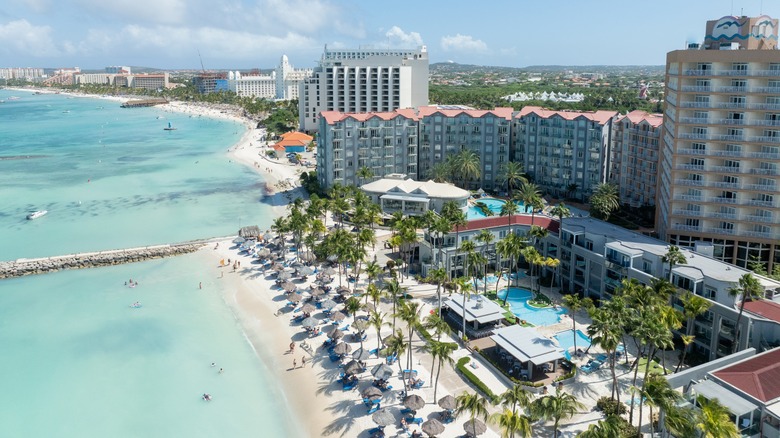
Aruba may be small, around 20 miles long and 6 miles wide, but this Dutch-Caribbean gem packs in a surprising mix of landscapes — from its desert-like interior to a rugged northern coastline, and calm southern stretch. Once a part of the Netherlands Antilles, it became a self-governing Dutch territory in 1986. Today, it's part of the Lesser Antilles, just north of the South American coastline.
Aruba currently sits at the top of the list of safest islands in the Caribbean in 2025, with an impressive safety rating of 9.3 out of 10. The island's record comes down to a few key factors. There have been no disastrous hurricanes in recent years (receiving a 10/10 score for this factor). Additionally, the island experiences low crime, and its healthcare standards and facilities are in line with Dutch standards. Aruba also lies outside of the Caribbean's main hurricane path, allowing it to remain unaffected by most regional storms. The last storm to hit the island was Hurricane Felix in 2007, and, even then, its impact was marginal. While much of the Caribbean experiences extreme heat and humidity, Aruba's climate stays dry and cool thanks to the steady northeasterly trade winds. This means that temperatures sit at a comfortable 82 degrees Fahrenheit year-round.
As expected, Aruba's appeal stretches far beyond safety. The island is home to four Marine Protected Areas and incredible natural preserves. This includes the famous Arikok National Park, which covers almost 20% of the island's landmass. Here, visitors can explore untouched white-sand beaches, rugged hiking trails, and some of the island's most pristine natural beauty, all while enjoying peace of mind in the Caribbean's safest destination.
Barbados
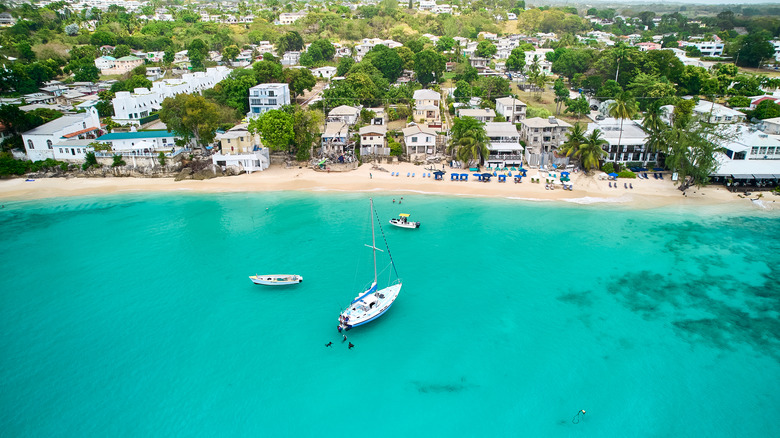
Barbados has long been a Caribbean favorite, and for good reason. Originally controlled by the Spanish in the 15th century, it passed into English hands in the 17th century and remained a colony until gaining its independence in 1966. Today, Barbados is one of the most densely-populated islands in the Caribbean. Roughly 90% of the population is Afro-Caribbean, reflecting its African roots and shaping the island's rich cultural heritage. From its music to its dance to its culinary traditions, Barbados feels like an exciting getaway.
Barbados is often celebrated as the Caribbean's best all-rounder. Beyond its heritage and laid-back vibe, it's also got some incredible hotels, historic sites, and, of course, its legendary rum. In fact, the country is the home of Mount Gay, the world's oldest rum distillery. Another major draw is the island's refreshingly inclusive approach to beaches. There are no private beaches here, which means every stretch of sand is open for everyone to enjoy. The result is an inviting, unpretentious atmosphere.
In terms of safety, the island ranks as the second safest island in the Caribbean, maintaining a 9.2 composite score thanks to its stable government, low crime rates in recent years, and a healthcare system that's often regarded as the most trusted in the region. It's the only country in the top five to receive full marks for its healthcare offerings. Medical care here is top-notch, with a ratio of roughly three doctors for every 1,000 residents, efficient emergency transportation, and solid urgent care facilities. Accessibility is another plus. With the Grantley Adams International Airport servicing flights to and from the island, Barbados is just a direct flight from New York, London, Miami, Atlanta, and other Caribbean destinations including Antigua, Grenada, and St. Maarten.
Grenada
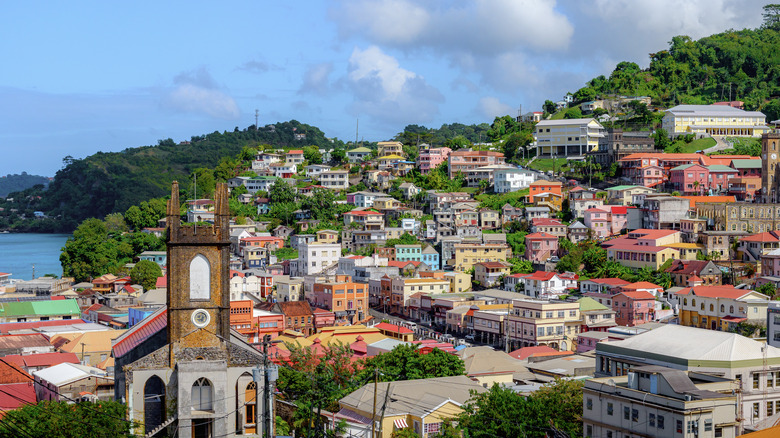
Nicknamed the "Spice Isle" thanks to its impressive production and export of nutmeg and other spices, Grenada sits among the Windward Islands. The nation is made up of three islands, with the main island of Grenada being home to St. George's — the capital city and harbor where cruise ships from Royal Caribbean and MSC regularly dock. While daytime visitors add a sense of busyness to the harbor, evenings still feel calm and laid-back. Far more than just a tourist destination, Grenada has become a magnet for expats thanks to its offshore tax haven status. The country has a program that allows people to receive citizenship through investing in the local economy, as well as good tax incentives and the chance to obtain a second passport.
Often hailed as one of the most underrated islands in the Caribbean, Grenada is fringed by 45 white-sand beaches and nine striking volcanic black-sand beaches. Inland, the island is scattered with waterfalls, hot springs, and a combination of tropical jungles and spice plantations. Beyond nutmeg, Grenada has carved out a reputation in the artisanal chocolate industry, with plenty of cocoa farms and sustainable chocolate producers inviting visitors to experience the entire bean-to-bar process.
Like Barbados, Grenada earns high marks for safety (a score of 9.0, to be precise), thanks to its relatively low crime rates. Violent crime is rare, with most reported incidents linked to opportunistic, non-violent offenses. The island also sits at low risk for hurricanes, with a perfect score for hurricane safety, and has solid preparedness measures in place, should one hit. While the U.S. lists Grenada as a low-risk travel destination, travelers should exercise common sense and take usual precautions like avoiding walking alone after dark and hailing legally licensed cabs.
Curaçao
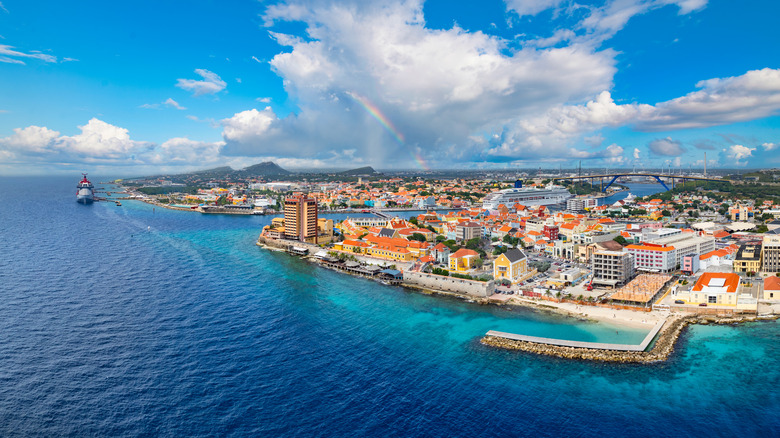
Curaçao is one of the most famous ABC islands (Aruba, Bonaire, and Curaçao) that rest just off the coast of South America. Like its neighbor Aruba, it has a rugged desert interior and exquisite beaches fringing the island, along with a strong Dutch-Caribbean heritage. It's the largest of these three islands, and is often considered to be the Caribbean's artistic and cultural hub. From the contemporary collections at the Landhuis Bloemhoef art center to sobering historical memorials at the Kura Hulanda Museum — which traces the legacy of the transatlantic slave trade — Curaçao combines history with natural beauty.
The island's capital city, Willemstad, shows a strong resemblance to the architecture of the Dutch capital of Amsterdam — except with more colorful homes and ocean views. This distinct look comes from the Dutch colonial era, when the Dutch West India Company controlled the slave trade in the region. This little island was also, tragically, one of the major transfer ports for slave ships en route to the American continents. Dark history aside, Curaçao is world-renowned for its incredible scuba diving locations, some of which are accessible by boat and others from the shoreline.
Curaçao currently holds a Level 1 travel advisory and matches Grenada's 9.0 safety rating, making it one of the safest choices in the Caribbean. The island benefits from strong medical facilities and the advantage of sitting just outside the Caribbean's hurricane belt. Even during peak hurricane season (June through November), the risk of a direct hit remains low. Accessibility is also a strong point, with the Hato International Airport welcoming flights from 13 countries. Direct flights connect Curaçao with Amsterdam, Charlotte, Atlanta, New York, and Toronto, along with plenty of regional Caribbean destinations.
Antigua And Barbuda
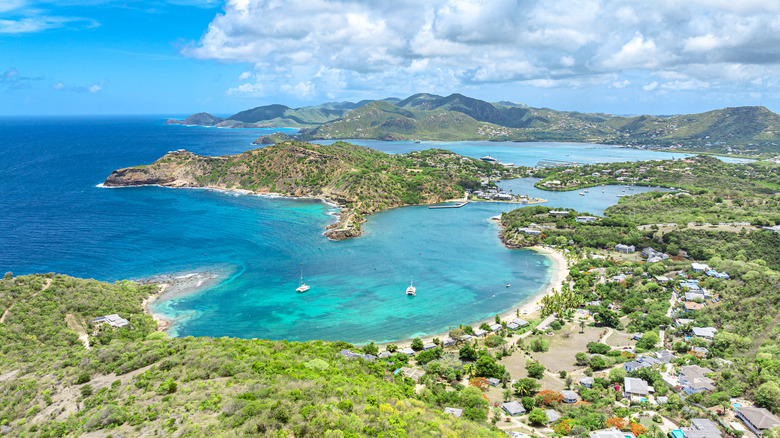
Antigua and Barbuda consist of two separate islands located where the Atlantic Ocean and Caribbean Sea converge. With 365 beaches, there is quite literally a beach for every day of the year between these two unique coral island paradises. The island also offers incredible diving opportunities, a vibrant local culture, and unique experiences like swimming with stingrays and exploring mangrove ecosystems.
According to the Human Development Report, Antigua and Barbuda is the most developed country in the Caribbean. Naturally, this distinction directly correlates to the country's high safety rating, ranking it as the fifth safest island in the region. That considered, things drop off quite significantly between it and its predecessor, with Antigua and Barbuda receiving a composite score of 8.1. Regardless, the country has a notable safety reputation thanks to its low tourist-targeted crime and effective crime prevention. The U.S. State Department classifies it as a Level 1 travel advisory, meaning travelers should "exercise normal precautions." As with any destination, this means visitors should be aware of opportunistic crime, keep watch of valuables, and purchase valid travel insurance to cover both theft and potential medical-related incidents. Antigua and Barbuda's lower score is largely thanks to its relatively modest healthcare rating, making medical insurance more important than ever.
For solo female travelers, Antigua and Barbuda is generally considered a safe country to travel alone. That said, solo travelers are recommended to use common sense and avoid certain areas, especially after dark. When it comes to water safety, tap water is typically safe to drink on the islands, although bottled water is always recommended. Like Grenada, Antigua and Barbuda also offers a tax-friendly expat environment and programs that allow individuals to obtain a second passport or citizenship through investment.
Ready to discover more hidden gems and expert travel tips? Subscribe to our free newsletter for access to the world's best-kept travel secrets.
Read the original article on Islands.
